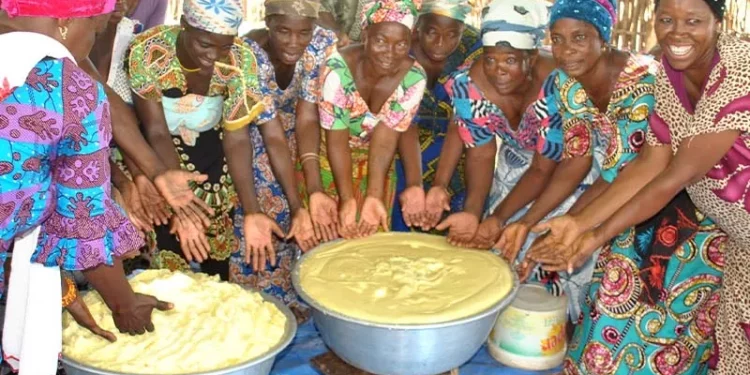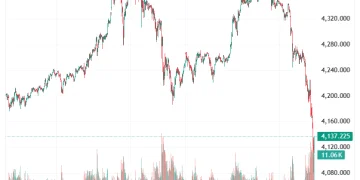Ghana’s shea industry is not taking care of the women behind its growth
Ghana’s shea industry has a rich history. Shea – nkuto, karite, galam in some west African languages – is deeply embedded in the culture and tradition of the country’s northern regions. It is often considered a woman’s crop – women pick the fruit and extract its “butter” – and has acquired the name “woman’s gold” because rural women earn income from its sale.
The crop is not just locally important, though. Shea butter, derived from the nuts of the shea tree, has become a global commodity. It is used widely as an ingredient in the confectionery, cosmetics and pharmaceutical industries.
A report by Future Markets Insights values the global shea butter market at US$2.75 billion. It’s expected to reach US$5.58 billion in 2033. In Ghana, shea is one of the top export commodities. According to the Ghana Export Promotion Authority, the export of shea butter was estimated to be worth US$92.6 million (38,792 tonnes) in 2022 and kernels US$20 million (36,162 tonnes) in 2021.
In spite of shea’s global prominence, primary actors in this sector aren’t reaping the benefits from these exports. Rural women, who are the primary producers, are also the lowest earners in the shea value chain, with an annual income of about US$234 per capita.
The reasons behind this were the subject of my PhD dissertation. I discovered that the shea environment was poorly regulated and “empowerment” policies had actually enabled poverty.
Importance of shea
Economically, shea has gained international prominence stemming from its properties and value. Stearin, a creamy fat, is used industrially as a cocoa butter equivalent in chocolate production and confectionery. Olein is used to make cosmetics.
Socially, activities in the shea industry confer on women a level of respect and power that they do not possess in other economic sectors. It’s also an area where women pass on indigenous knowledge from one generation to another by observing and participating in shea activities.
Shea trees also provide carbon sinks and storage, improve soil fertility and promote better yields in agroforestry systems.
The shea industry is potentially a vehicle for economic development, environmental sustainability, gender empowerment and social progress.
Shea policies
These benefits are not all being realised, however.
Structural adjustment reforms were implemented in Ghana in the late 1980s and early 1990s to address economic woes. The shea export policy devised within that framework has been identified as a watershed moment for the problems inherent in the industry. The state’s involvement in the economy was reduced, and this created the conditions for continued gender inequality and exploitation. The plight of women in the shea industry was not helped, either, by long-held gender norms and cultural underpinnings in northern Ghana.
Successive governments and institutions over the years have sought to revamp the industry through regulatory policies and interventions. A chapter of my PhD thesis conducted in 2017 analysing the yearly budget statements from 2002 to 2017 noted the government’s knowledge of the persistent challenges of rural women.
These challenges relate to quality control and standardisation. Others are the lack of fair-trade practices, limited access to direct markets and resources, and challenges in land tenure and resource management.
Liberalising the shea market was expected to promote economic growth through reducing trade barriers and encouraging foreign investment. However, a downside was the breakdown of social contracts, leading to a “gold rush” mentality that prevails when there are no structures and regulations.
The 2008 Tree Crops Policy was supposed to support agricultural growth, rural development and food security. A Shea Unit under the Ghana Cocoa Board was formed in 2011 to develop strategy for the sector. This unit was expected to become a Shea Development Board, responsible for introducing effective production, post-production and marketing initiatives. But it remains under the cocoa board.
The shea industry over time has been a niche where middlemen and women buy shea from rural women at low prices. Price negotiations are done on behalf of rural women on a mostly informal contractual basis. A chapter of my PhD thesis analysing the cost structure and assigning a value to the unpaid labour of rural women reported the profit margin of a shea nut picker as Gh₵ 8.82 (66 US cents) while a middleman earned Gh₵ 49.5 (US$4) on a 100kg bag of shea nuts. Similarly, a shea butter extractor earned Gh₵ 1.92 (8 cents) while a middleman earned Gh₵ 63.42 (US$6) on a 25kg box of shea butter.
This is aptly captured in an interview:
We are always here and we see people troop in for them (shea butter). Because we don’t understand the English language they always request for Madam. She directs us to sell to them at a certain amount. We don’t know the buyers. They are those bringing them, we will just be sitting, and they will tell you that they are to buy shea, there is a buyer in, we will not even see the person. She is going to negotiate with the buyer till they finish buying.
Shea business model
Even with the best of intentions, desired policy objectives can’t always be reached. It’s necessary to analyse why.
Empowering rural women shea actors to make choices and to transform those choices to desired outcomes must start by recognising them as knowledge producers and involve them as knowledge contributors in policies. Ghana needs to bring all the players in the shea industry together to develop a business model. Primary producers, middlemen, sourcing companies and government should collaborate.
Drawing from lessons on the marketing of cocoa in Ghana, this model should focus on:
- regulation of ceiling and floor prices of shea nuts and butter
- promoting community-based rural producer groups
- capacity building
- quality improvement
- preserving the shea landscape.
There is also a need for a government instituted shea body to enforce a regulatory framework on the licensing and registration of activities and the promotion of partnerships between actors in the shea supply chain. It’s very important for the various stakeholders to keep working together to minimise undesirable effects of proposed interventions.
Shea is indeed golden. But there are real people living with the impact of weak institutional structures and policy frameworks. The most affected are rural women.








